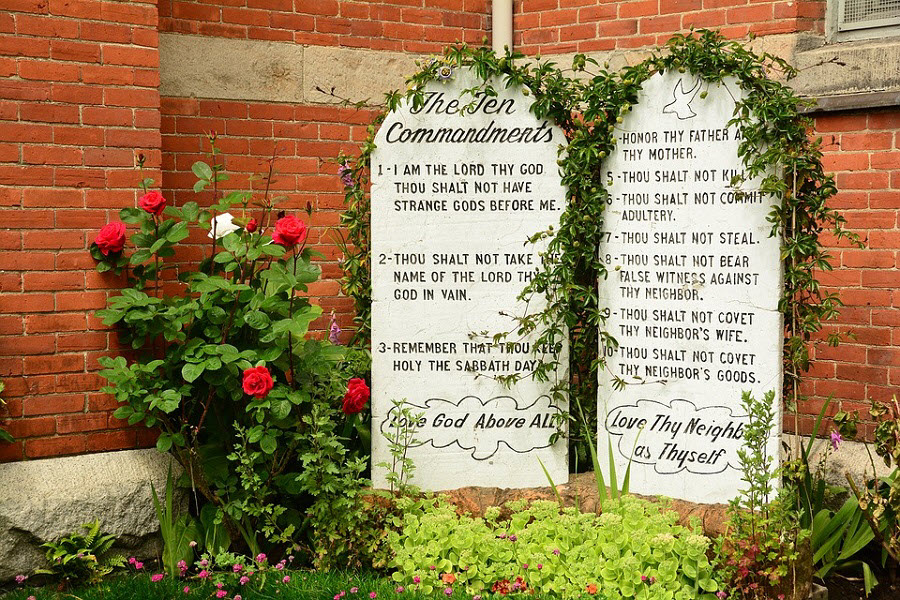Blog & Pastor Letters

Third Sunday of Lent – March 3, 2024
03-03-2024Weekly ReflectionRev. Mark HellingerOf the many powerful scenes in the epic biopic Pope John Paul II, starring Jon Voight and Cary Elwes, one continually sticks with me. Early in the movie, in a flashback to his childhood, the young Karol falls to the ground and awakes, injured, to his mother’s voice of comfort. Here we have a beautiful example of a parent handing on, in the truest sense, the Faith of the Church. His mother tells him (and I am paraphrasing), Karol, life is confusing and complicated, God is simple. Let me show you the simple way: “In the Name of the Father, of the Son, and of the Holy Spirit.”
In a way that might not be apparent at first, the simplicity of God is offered to us today through the readings. And in the midst of our Lenten pilgrimage toward Easter, this aspect of simplicity is decisive. What we see throughout all of our readings today is that sin complicates life, but God’s Word, which is his Law and Wisdom, is simple and simplifies our life.
In our first reading we see the first instance of the giving of the Law. Here it is simple: ten words of life, a Decalogue, which echo the ten creative words of Genesis. God reveals to his Chosen People the simple logic of His life. These laws reveal how a human person can flourish — how he or she can live a life which reflects God’s plan and thereby become recreated in freedom. It is in the second giving of the Law, Deuteronomy, where we will see that humanity complicates the law and needs more clarification.
The psalmist provides an example of a praying soul wrapped up in the simplicity of the Law — the realization that these Words are a gift to us, which take the guesswork out of living a morally upright and fulfilling life. Indeed, the Words of God are words of life, not death.
Further, Paul speaks to this human experience in pointing out that Christ crucified is a stumbling block to the Jews and foolishness to Gentiles; yet for those who have been called, that is, for the Church, the mystery of Christ is actually showing us God’s power and wisdom.
In the Gospel we enter the scene of Christ clearing out the Temple — clearing out the confusion of years of human interpretation of the Law, which lost the spirit of the Law and turned the Temple of God into a marketplace. Christ enters and trims down the excess to remind everyone what the Temple itself is, and adds a simple promise, a promise which his hearers misunderstand because of their complicated conceptions. John clarifies for us: he was speaking about his body when he promised to raise it in three days.
So where does all of this leave us? On one level, we can see an encouragement for us here in the midst of the season of Lent — this time is less about our feats of spiritual strength and more about reducing the distractions and complexities of our lives. Often Lent can be a good time for us all to take a good look at our lives and assess what is actually essential, what actually brings life and draws us closer to God. What have we added which draws us away from the simple and straightforward and adds complexity (that is, our own impositions) into our relationship with God?
Now of course this is not to say that all complexity is bad; rather, complexity which we add by our own ideas and desires is what I am talking about. Depth is different than complexity for its own sake. To grow in deeper relationship with God is to go deeper into the mystery. And that is what God desires for us.
So we can see that on a deeper level, the readings this Sunday invite us into deeper relationship with God, deeper relationship via a simplification of our approach to that relationship. And this dynamic is given words by our Prayer after Communion today, where we will pray for the grace to abide in the love of God and neighbor, so as to fulfill the whole of God’s commands.
The simplicity of the Gospel is its deepest challenge. To realize what it means to love God and neighbor with everything we have and are, to live in the depth and simplicity of who God has revealed himself as — these are the essential tasks of the Christian life. And we can see that simple prayer — the sign of the Cross — expresses the simplicity and depth of God’s desire for us in one statement and action of the complete mystery of our faith.
BACK TO LIST